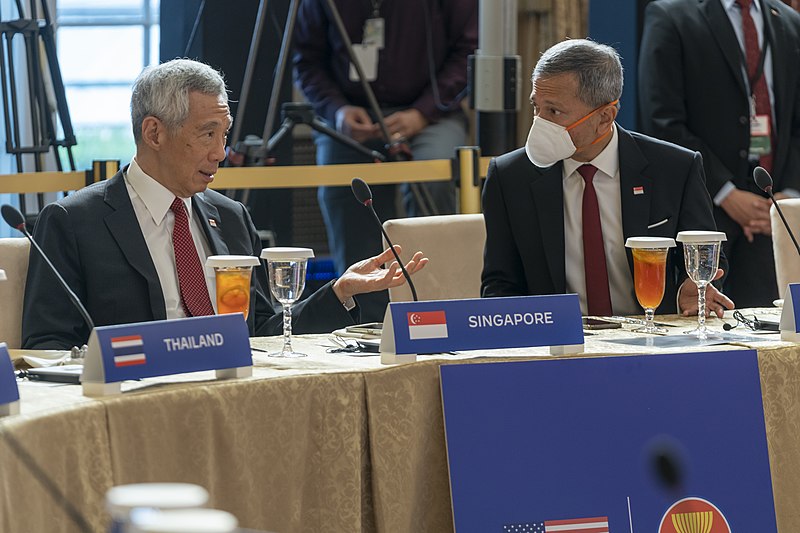Singaporean Prime Minister Lee Hsien Loong said his country would work with Indonesia and international partners to help push the Myanmar military to implement the peace plan drafted by the Association of Southeast Asian Nations. The comments come amidst frustration by the ASEAN bloc over the lack of progress by the junta, which seized power in February 2021.
Lee said on Thursday Singapore will work with current ASEAN chair Indonesia and the rest of the bloc’s member countries, along with international partners like the United Nations, to push for the implementation of the peace plan. Lee’s comments followed his meeting with Indonesian President Joko Widodo.
Shortly after Myanmar’s generals seized power in a coup in February 2021, ASEAN drafted a five-point peace plan that included an end to the violence and a return to democratic norms. The Myanmar military’s coup leader agreed to the peace plan, but there has been little progress on its implementation in the country.
“Singapore will continue working with Indonesia and ASEAN members, plus ASSEAN’s partners like the UN to push for the full implementation of the five-point consensus,” said Lee.
Thousands of those who opposed the coup have been detained, and hundreds were killed by the Myanmar military for opposing military rule. The military has since been facing armed resistance groups on multiple fronts. Ousted politicians and pro-democracy groups have since formed the shadow National Unity Government, which the junta has outlawed as “terrorists.”
On Friday, a post-mortem report released last week found that around 22 people, including three Buddhist monks, were shot dead at close range in central Myanmar. Opponents of the junta said the incident was a massacre of civilians carried out by the military. The spokesperson for the junta, Zaw Min Tun, said the military was involved in clashes with rebel fighters in the Pintaung region of the southern Shan area but did not attack any civilians.
However, a spokesperson for the Karenni Nationalities Defense Force said its fighter entered Nan Neint on Sunday only to find dead bodies scattered at a Buddhist monastery. Video footage and photos provided by the KNDF and another rebel group, the Karenni Revolution Union, showed bullet wounds to the torso and heads of the bodies and bullet holes in the monastery walls.



 U.S.-India Trade Framework Signals Major Shift in Tariffs, Energy, and Supply Chains
U.S.-India Trade Framework Signals Major Shift in Tariffs, Energy, and Supply Chains  Trump Lifts 25% Tariff on Indian Goods in Strategic U.S.–India Trade and Energy Deal
Trump Lifts 25% Tariff on Indian Goods in Strategic U.S.–India Trade and Energy Deal  India–U.S. Interim Trade Pact Cuts Auto Tariffs but Leaves Tesla Out
India–U.S. Interim Trade Pact Cuts Auto Tariffs but Leaves Tesla Out  TrumpRx.gov Highlights GLP-1 Drug Discounts but Offers Limited Savings for Most Americans
TrumpRx.gov Highlights GLP-1 Drug Discounts but Offers Limited Savings for Most Americans  Trump Signs “America First Arms Transfer Strategy” to Prioritize U.S. Weapons Sales
Trump Signs “America First Arms Transfer Strategy” to Prioritize U.S. Weapons Sales  Ohio Man Indicted for Alleged Threat Against Vice President JD Vance, Faces Additional Federal Charges
Ohio Man Indicted for Alleged Threat Against Vice President JD Vance, Faces Additional Federal Charges  TrumpRx Website Launches to Offer Discounted Prescription Drugs for Cash-Paying Americans
TrumpRx Website Launches to Offer Discounted Prescription Drugs for Cash-Paying Americans  Jack Lang Resigns as Head of Arab World Institute Amid Epstein Controversy
Jack Lang Resigns as Head of Arab World Institute Amid Epstein Controversy  Netanyahu to Meet Trump in Washington as Iran Nuclear Talks Intensify
Netanyahu to Meet Trump in Washington as Iran Nuclear Talks Intensify  U.S. Announces Additional $6 Million in Humanitarian Aid to Cuba Amid Oil Sanctions and Fuel Shortages
U.S. Announces Additional $6 Million in Humanitarian Aid to Cuba Amid Oil Sanctions and Fuel Shortages  Trump’s Inflation Claims Clash With Voters’ Cost-of-Living Reality
Trump’s Inflation Claims Clash With Voters’ Cost-of-Living Reality  U.S. to Begin Paying UN Dues as Financial Crisis Spurs Push for Reforms
U.S. to Begin Paying UN Dues as Financial Crisis Spurs Push for Reforms  Trump Backs Nexstar–Tegna Merger Amid Shifting U.S. Media Landscape
Trump Backs Nexstar–Tegna Merger Amid Shifting U.S. Media Landscape  Trump Signs Executive Order Threatening 25% Tariffs on Countries Trading With Iran
Trump Signs Executive Order Threatening 25% Tariffs on Countries Trading With Iran  Trump Endorses Japan’s Sanae Takaichi Ahead of Crucial Election Amid Market and China Tensions
Trump Endorses Japan’s Sanae Takaichi Ahead of Crucial Election Amid Market and China Tensions  U.S. Lawmakers to Review Unredacted Jeffrey Epstein DOJ Files Starting Monday
U.S. Lawmakers to Review Unredacted Jeffrey Epstein DOJ Files Starting Monday  Nighttime Shelling Causes Serious Damage in Russia’s Belgorod Region Near Ukraine Border
Nighttime Shelling Causes Serious Damage in Russia’s Belgorod Region Near Ukraine Border 































